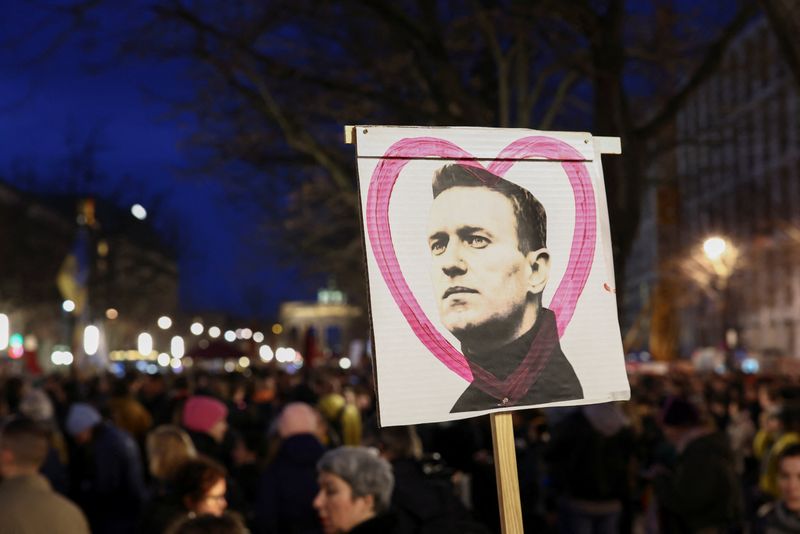
©Reuters. A sign with the image of Russian opposition leader Alexei Navalny is seen as people attend a vigil held in front of the Russian embassy in Berlin following his death, Germany, February 16, 2024. REUTERS/Liesa Johannssen
2/5
BERLIN/VILNIUS (Reuters) -Hundreds of protesters, many of them Russian émigrés, gathered in cities across Europe and beyond on Friday to express their outrage at the death of Kremlin critic Alexei Navalny.
Often gathered in front of Russian embassies, they chanted slogans critical of Russian President Vladimir Putin, who they blamed for the activist’s death, holding up signs calling him a “murderer” and demanding accountability.
Putin’s most formidable domestic opponent, Navalny, fainted and died Friday after a walk in the Arctic penal colony where he was serving a three-decade sentence, prison authorities said.
In Berlin, police estimated, a crowd of 500-600 people gathered on the Unter den Linden boulevard, chanting in a mix of Russian, German and English.
Some chanted “Putin in The Hague,” referring to the International Criminal Court investigating possible war crimes committed in Ukraine.
Police used barriers to close the road between the Russian embassy and the crowd.
“Alexei Navalny is the leader of the Russian opposition and we have always had hope in his name,” said a Russian man wrapped in a blue and white pacifist flag, giving his name only as Ilia.
In Lithuania, previously ruled by Moscow but now a member of NATO and the European Union and home to a sizeable émigré community, protesters laid flowers and candles next to a portrait of Navalny.
“He was always with us, so it’s all surreal,” said Lyusya Shtein, 26, a Pussy Riot activist who has lived in Vilnius since leaving Russia in 2022. “None of us still understand what happened.”
In Russia itself, prosecutors have warned Russians against participating in any mass protests in Moscow. Police watched as some Russians came to lay roses and carnations at a monument to victims of Soviet repression in the shadow of the former KGB headquarters.
Rights group OVD-Info, which reports on freedom of assembly in Russia, said more than 100 people had been arrested during demonstrations in Navalny’s memory. Reuters could not immediately verify the report.
Groups also gathered in Rome, Amsterdam, Barcelona, Sofia, Geneva and The Hague, among others.
More than 100 protesters stood outside the Russian embassy in London, holding signs calling Putin a war criminal, while in Lisbon hundreds of people held a silent vigil. Pavel Elizarov, a 28-year-old Russian living in Portugal, said Navalny was “a symbol of freedom and hope.”
Near the Russian embassy in Paris, where about 100 protesters gathered, Natalia Morozov said Navalny was also a symbol of hope for her.
“It’s hard for me to express my emotions, because I’m really shaken,” Morozov said. “Now we have no hope for the beautiful Russia of the future.”
Navalny’s death, if confirmed, leaves the scattered groups that oppose Putin without a figurehead, and without an obvious candidate who can channel discontent over his passing into mass protests.
Navalny’s wife, Yulia, was in Munich on Friday, where a vigil was also held. She told the Munich Security Conference that she could not be sure her husband was dead because “Putin and his government … lie incessantly” but said if confirmed she wanted them to know “they will take responsibility “.
Across the Atlantic, during a vigil outside the Russian consulate in New York, Violetta Soboleva said she volunteered for Navalny’s presidential campaign in 2017.
“I really believed that he was the right man and that he could lead Russia to a better future,” said Soboleva, a Russian studying for her doctorate in New York. “And now we have lost this future forever.”